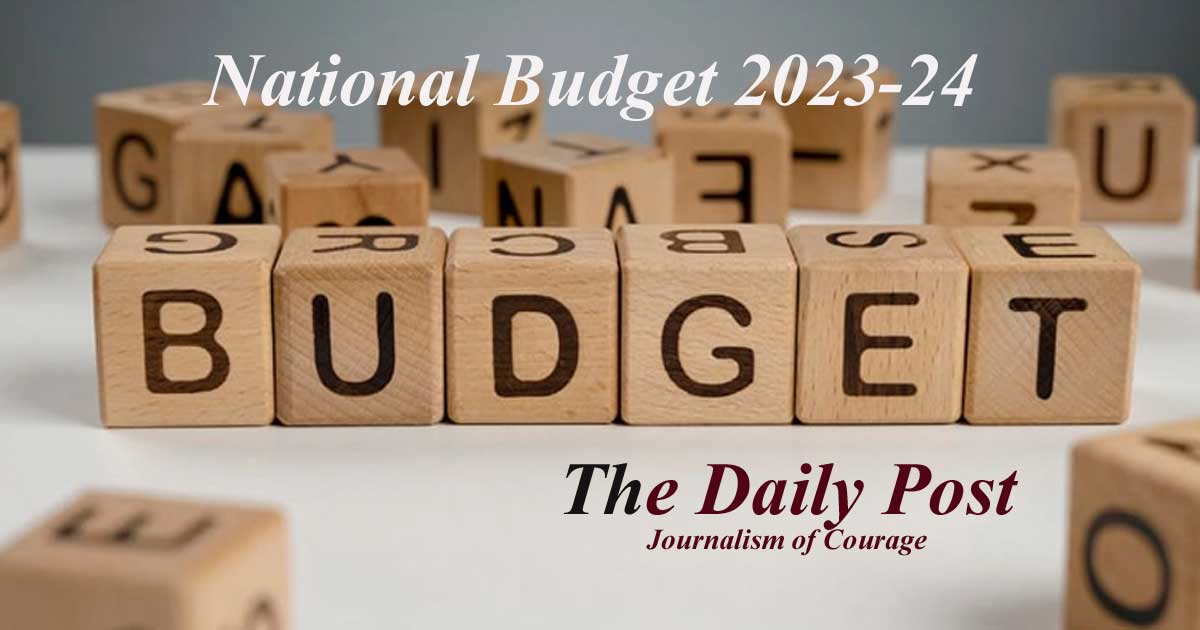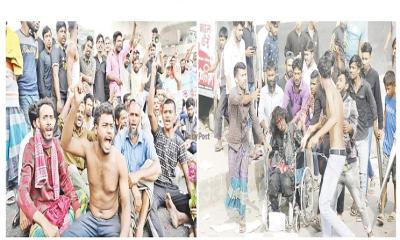- Spending increases 15% for 'Smart Bangladesh’
- Paperless & cashless society to be created
- Health care will reach everyone's doorstep
‘Revenue target not realistic’- Mirza Azizul Islam, Economist
The election’s buzz will be started with the start of the financial year. Public life is in turmoil due to rising inflation. The reserves continue to fall to cope with the acute dollar crisis. An unprecedented fall in the domestic currency. The government has to borrow from the central bank due to the liquidity crisis in the banking system. The IMF's tough conditions in the foreign lending process to deal with the situation. Everything is turned upside down by the shock of reform. In such a situation, Finance Minister AHM Mustafa Kamal has proposed a strategic budget to relieve pressure.
In the last year of the current term of the government and before the 12th national election, the finance minister did not have much scope for public appeasement. Nevertheless, he has brought back the election slogan to reach smart Bangladesh in the budget. The title of this year's budget is 'Smart Bangladesh's journey after one and a half decades of development'.
The finance minister presented the budget proposal for the fiscal year 2023-24 in the Parliament yesterday in the presence of Prime Minister Sheikh Hasina. Earlier, President Md. Shahabuddin signed the resolution after the approval of the cabinet.
A budget of Tk 7,61,785 crore for the new fiscal year has been presented before the Jatiya Sangsad. The proposed expenditure is 15.33 percent more than the revised budget of the outgoing fiscal year (Tk 6,60,507 crore). This amount is equal to 15.21 percent of the total GDP of Bangladesh. The size of the budget given by Mustafa Kamal in the outgoing fiscal year 2022-23 was 14.24 percent more than the revised budget in the fiscal year 2021-22 and equal to 15.23 percent of the GDP.
In his budget speech, the finance minister said, "The per capita income of our 'Smart Bangladesh' will be at least $ 12,500; Less than 3 percent of people will be below the poverty line and extreme poverty will fall to zero; Inflation will be limited to 4-5 per cent; The budget deficit will be below 5% of GDP; The revenue-to-GDP ratio will be over 20 per cent; Investment will be 40 percent of GDP.
"100 per cent digital economy and science and technology-based literacy will be achieved. Health care will reach everyone's doorstep. All the necessary services of the citizens, including automated communication system, sustainable urbanization, will be at hand. Paperless and cashless societies will be created. Most importantly, a society based on equality and justice will be established in smart Bangladesh. ”
The development sector has always been given more importance in the budgets of the present government. In continuation of this, the development expenditure has been increased by 15 percent to Tk 2,77,582 crore. Of this, the size of the Annual Development Programme (ADP) is Tk 2,63,000 crore. This year, the operating cost (excluding loans, advance and debt repayment, food accounts and structural adjustments) has been estimated at Tk 4,75,281 crore, which is about 14.72 percent more than the revised under-development budget of the outgoing fiscal year. Of this, Tk 94,376 crore will go towards repayment of interest on government loans, which is about 20 percent of the total underdevelopment expenditure. Another 16.20 per cent of the under-development expenditure is spent on payment of salaries and allowances to the employees of the Republic, amounting to at least Tk 77,000 crore.
Although the NBR is far behind the target of the outgoing fiscal year in revenue collection, Mustafa Kamal hopes that he will get about 66 percent of the potential expenditure of the new fiscal year from the revenue sector. In his proposed budget, the revenue sector has been estimated at Tk 5,03,900 crore. This figure is 15.50 percent more than the revised revenue of the outgoing fiscal year. Of this, Tk 4,30,000 crore is expected to be collected as tax through the National Board of Revenue. As a result, the NBR's tax collection target is increasing by more than 16 percent. That figure is 56.44 per cent of the total budget.
Like last time, the target of collecting the highest tax has been set from value added tax or VAT, Tk 1,63,837 crore. This figure is about 12 percent compared to the revised target of the outgoing fiscal year. In the budget of the outgoing fiscal year, the target of collecting revenue from VAT was Tk 1,41,192 crore. In the amendment, it was increased to Tk 1,46,227 crore.
This year's budget is expected to generate Tk 1,53,260 crore from taxes on income tax and profits. In the outgoing revised budget, the amount was Tk 1,21,094 crore. In the new budget, the finance minister plans to collect Tk 46,015 crore from import duty, Tk 60,703 crore from supplementary duty, Tk 66 crore from export duty, Tk 4,579 crore from excise duty and Tk 1,540 crore from other taxes and duties. Besides, he hoped to get Tk 3,900 crore from foreign grants.
In the original budget of the outgoing fiscal year, the total revenue collection target was set at Tk 4,36,271 crore, which was slightly reduced to Tk 4,36,263 crore, although only 60 percent of the target has been achieved in the period till March.
Responding to the budget, Economist Mirza Azizul Islam said that the revenue target set for the next fiscal year is not realistic. It will be difficult to achieve. However, efforts should be made to increase revenue collection. Bangladesh has the lowest tax collection in the world as a proportion of GDP. It is even less than neighbouring Nepal.
In his budget speech, the finance minister said, "The fiscal sector's policy strategy will be to mobilize domestic resources, increase spending efficiency and explore domestic and foreign sources of affordable financing to meet the challenges of the post-transition period from the least developed country." We want to use all possibilities to generate revenue.
"Tax revenue collection will be significantly increased through activities such as expansion of tax nets, rationalization of tax exemption, installation and expansion of electronic fiscal devices to collect value-added tax in an automated and transparent manner, online VAT registration, automation of tax administration, etc. ”
The size of the original budget for the fiscal year 2022-23 was Tk 6,78,064 crore. In the revision, it has come down to Tk 6,60,507 crore. In the budget proposal presented by the finance minister for the new fiscal year, the overall deficit in income and expenditure is a record Tk 2,57,885 crore, which is equivalent to 5.2 percent of the total GDP. Usually, an attempt is made to prepare a budget by keeping the deficit within 5 percent. However, this has not been possible for the last few years due to pressure to raise money. As always, the finance minister will have to rely on domestic and foreign debt to meet the budget deficit. He hopes to meet the deficit by borrowing Tk 1,27,190 crore from abroad and Tk 1,55,395 crore from domestic sources. Among the domestic sector, a record Tk 1,32,395 crore has been set to be borrowed from the banking sector, Tk 18,000 crore from savings certificates and another Tk 5,000 crore from other sectors.
The finance minister had set a target of 7.5 percent GDP growth in the outgoing fiscal year's budget. Based on the nine-month estimate, the government expects it to be 6.03 percent by the end of the financial year. However, the finance minister hopes that if his new budget is implemented, it will be possible to achieve 7.5 percent GDP growth by keeping inflation within 6 percent.
Pressure of budget on the life of middle class & poor:
The new budget has indicated an increase in the prices of almost all types of products. The cost of living will increase further under the pressure of taxes and taxes. The plan to deal with the crisis and increase revenue by removing subsidies under pressure from the IMF will increase the pressure on public life. To facilitate domestic production, the amount of gold bars brought has been reduced in half and double duty has been imposed on it. As a result, the price of gold will increase further. Apart from this, the cost of marriage will increase due to the increase in the prices of cosmetics, cosmetics and luxury products.
As a result, this budget has brought disappointment to the youth. On the other hand, when the people, crushed by the pressure of high inflation, are breaking their savings and running their families in the fight for survival; Just then, the new budget came up with news of being caught in the tax net. In the proposed budget, the finance minister has proposed to increase the minimum income tax to Tk 2,000. That is, taxpayers who have income below the tax-free limit, but are required to file income tax returns for services from the government, will have to pay a minimum tax of Tk 2,000. However, there is some good news for individual taxpayers in the last budget of the present government. In the new budget, it has been proposed to increase the tax-free income limit of this category of taxpayers by Tk 50,000 to Tk 3.5 lakh.
That is, income up to Tk 3.5 lakh a year will not have to pay tax. Besides, it has been proposed to increase the tax-free income limit from Tk 3.5 lakh to Tk 4 lakh for citizens and women above 65 years of age. At the same time, the finance minister proposed to fix the minimum tax rate at 5 percent and the maximum tax rate at 25 percent. From the next financial year, tax will be paid at the rate of 5 percent on the total income up to Tk 1 lakh more than Tk 3.5 lakh. His total income up to Tk 3 lakh will have to be taxed at the rate of 10 percent. Income up to Tk 4 lakh will be taxed at the rate of 15 per cent. Income up to Tk 5 lakh will be taxed at the rate of 20 per cent and income above this will be taxed at the rate of 25 per cent. Economists are suggesting speeding up social security programs to tackle inflation.
But there is no big good news in this sector. In the proposed budget, the monthly old age allowance has been increased from Tk 500 to Tk 600. And the allowance of widows and husband victims has been increased by Tk 50 to Tk 500 to Tk 550. In addition, disability beneficiaries have been increased from 23.65 lakh to 29 lakh. The rate of monthly education stipend for students with disabilities has been increased to Tk 50 at the primary level and Tk 150 at the secondary and higher secondary level. The finance minister said the number of hijra beneficiaries has been increased by 18 per cent from 4,815 to 6,000 and the number of special beneficiaries has been increased to 2,600.
JH






